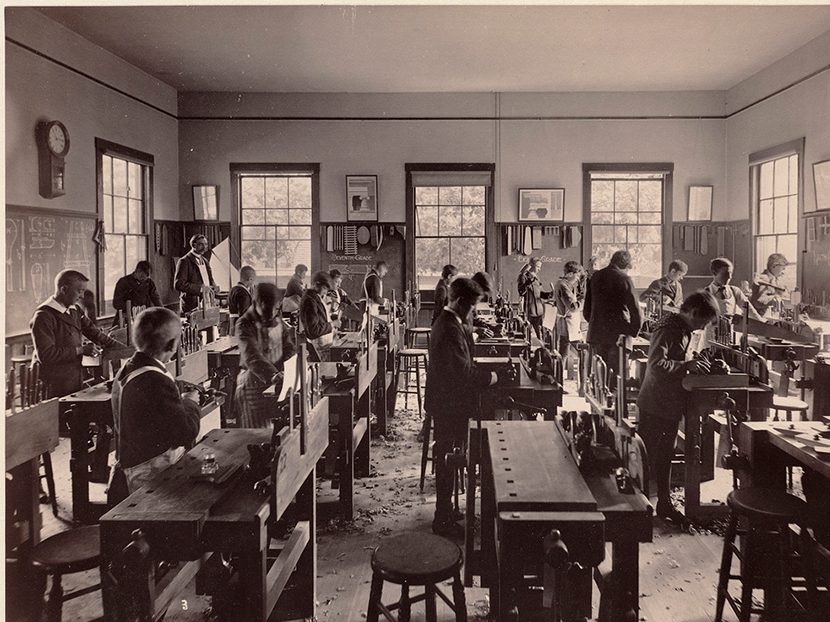The Big Storage Room
Shop class should be a priority for future students.

When I was in eighth grade, there was a day that I had to select the classes I would take in the first year of high school. There was a science class fork in the road. Option one was to take Chemistry 1, which would prepare me for the other harder science classes, and eventually college. Option two was to take Biology 1, which covered one of the science requirements that I would need for bare minimum graduation, and leave more room in my schedule for agricultural studies classes and shop.
It was also explained to me that college graduates would make $1,000,000 more in the course of their careers than non-graduates. The choice seemed simple to me because I would enjoy an extra million dollars. At no point was the shop class route sold as a completely viable way to be rich and happy.
After taking Chemistry 1, I continued down the academic path and went to college, with the intent to get a cool medical field job where I would wear a tie and drive a nice car. For various reasons, including the fact that I wasn’t actually that good at chemistry equations, I graduated college without a clear path to the nice car and million dollars. At that point, I realized that I actually enjoyed being in the trades more than the career I had been working toward. I always loved building things in our shop growing up, and it may have just taken the time away from that lifestyle to appreciate it more.
I don’t want to discount the value of going to college. The experience of living away from home with a group of people from all different backgrounds shaped my outlook on life in a way that may have not been possible if I went right to work in the same city I grew up in with people who look like me. Half the value of college is having people challenge the things you deeply believe to be true to see if you actually understand those issues. If college isn’t in your future, find a mentor who will bust your chops in the hopes of making you better at what you do. There are a lot of them around the plumbing industry.
At this point, for many of students, shop classes may not even be an option. Schools with budget or space limitations may not prioritize shop class. For some students, that may mean one of few classes they could have excelled in is no more.
Time Magazine writes of a shop program at Analy High School in Sebastopol, California:“... [the program] had become largely irrelevant. The main shop room had become little more than a glorified storage room. The school’s priorities were firmly focused on college readiness and success at standardized tests, and vocational programs had taken a backseat.” The motivation to score well on standardized tests has outweighed the benefits of working with tools.
The article continues: “Sebastopol is also the home of Make magazine, one of the leading voices of the maker movement, a community of inventors and do-it-yourselfers that has blossomed on YouTube and shows up in the tens, and sometimes hundreds of thousands, at maker fairs all over the world. Make proposed that a group of students from Analy come to its offices to explore the possibilities involved in creating things with 3D printers, computer-aided design and more. The program was so popular that soon Make could no longer accommodate it in its offices, so it agreed to donate equipment to Analy if the school would ramp up its vocational program.” It found that the kids on either end of the standardized testing bell curve were interested in the cool projects they could make in shop.
A 2006 TED Talk by Sir Ken Robinson entitled “Do Schools Kill Creativity?” explains that our education system values right answers more than creativity. Sir Robinson stated: “What we do know is, if you’re not prepared to be wrong, you’ll never come up with anything original. And by the time they get to be adults, most kids have lost that capacity. They have become frightened of being wrong. And we run our companies like this. We stigmatize mistakes. And we’re now running national education systems where mistakes are the worst thing you can make. And the result is that we are educating people out of their creative capacities.”
Robinson concluded: “Our education system has mined our minds in the way that we strip-mine the earth: for a particular commodity. And for the future, it won’t serve us. We have to rethink the fundamental principles on which we’re educating our children.”
There is an approach that eliminates the academic fork in the road, according to a 2014 Atlantic article. A few schools in Georgia have been working with this model. They call it the career and technical education (CTE) approach. “The lines between electives, college-preparatory work and career exploration are blurring. Schools that take this seriously can use career courses to elevate every student’s education, rather than to warehouse the students lagging behind.”
If you have a kid in school now and shop isn’t a choice they have, look for a makers space near you and take a trip to check it out. A good maker space will combine the shop class atmosphere mixed with the Internet of things. Makersmiths is a group near my office in Virginia that offers basic woodworking classes to Arduino microprocessor programming classes.
What does this mean for the plumbing and heating industry? The National Association of Home Builders published a single-family builder survey with a sample size of 298 respondents. In its summary, it found younger workers with less experience may need more monitoring and training, which could reduce efficiency and drive up costs. Training a new employee at any time probably works like that, to some extent. The problem is that when you multiply that by the 700,000 new construction industry jobs since 2011, the effect is noticeable.
Investing in training is money well spent, but it would be nice if the new person you hire at least knows how to turn a wrench. This is part of the missing shop class component. New employee training and monitoring will always be part of the process, but each cohort of students that doesn’t have the option to learn how to use basic tools before entering the workforce will need more help.
The bottom line is that no decision that you make in middle school determines your success ceiling. Ambitious people create opportunities. Additionally, people will give up a lot of things before indoor plumbing, so you are pretty safe with a blue collar, white collar, green collar or any other type of shirt in the field of plumbing.





